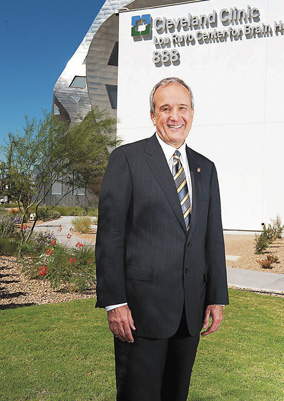NEW HOPE?
March 22, 2015 by Las Vegas Black Image Magazine
Filed under Feature
At the Cleveland Clinic Lou Ruvo Center for Brain Health, a clinical trial will test a drug that researchers hope will bring relief to those at risk for Alzheimer’s disease.

Larry Ruvo is spearheading the development of the Cleveland Clinic Lou Ruvo Center for Brain Health in Nevada.
Cleveland Clinic Lou Ruvo Center for Brain Health is recruiting participants for a new clinical trial. The A4 trial is free to participate in, and is investigating whether treating older individuals with the investigational drug, solanezumab, can delay memory decline in those who may be at risk to develop Alzheimer’s disease (AD).
A4, which stands for Anti-Amyloid Treatment in Asymptomatic Alzheimer’s study, also aims to learn more about brain markers and other tests to better predict who will experience memory decline and progress toward Alzheimer’s-related dementia.
The three-and-a-half year study will test an experimental anti-amyloid antibody medication called solanezumab in people who may be in an asymptomatic stage of Alzheimer’s disease — having evidence of elevated amyloid buildup in their brain, but normal thinking and memory function. PET amyloid imaging scans will be used to determine whether potential participants have evidence of elevated amyloid buildup. The overall goal of the A4 study is to determine whether decreasing amyloid in the brain with antibody treatment can help slow the memory loss associated with amyloid buildup in some people.
“If the drug proves effective, it would be a paradigm shift in the way we think about Alzheimer’s. That’s what makes this study so exciting,” says Charles Bernick, M.D., Associate Medical Director of Lou Ruvo Center for Brain Health. “People with risk factors would be tested and, if they had amyloid deposits, they could be treated before developing symptoms.”
A4 is just one of the Alzheimer’s disease prevention trials currently seeking recruitment at the center. Researchers are also recruiting participants for an AD clinical prevention trial called TOMORROW, that is designed to test the effectiveness of using a currently-approved diabetes drug to prevent the development of Alzheimer’s Disease in people who are predisposed to develop the condition. The study will also look at whether a new genetic biomarker, TOMM40, is an additional indication of a patient’s elevated risk of developing the disease.
For more information, including how to participate in the A4 and TOMORROW Alzheimer’s disease clinical prevention trials, call (855) LOU-RUVO, visit www.clevelandclinic.org/brainhealth or email brainhealth@ccf.org.






